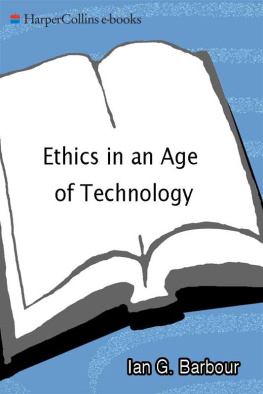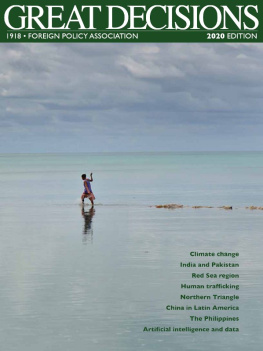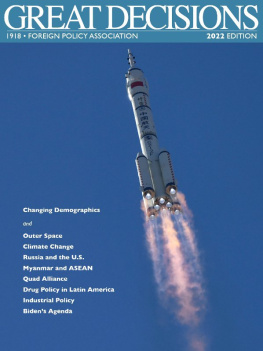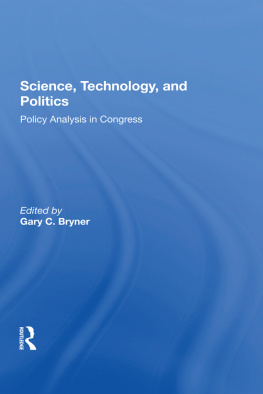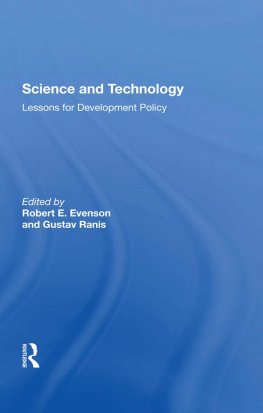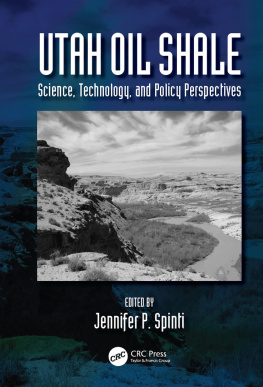SCIENCE, TECHNOLOGY, AND POLICY DECISIONS
About the Book and Authors
This text, written by a philosopher of science and a political theorist, introduces students to the issues and controversies surrounding science and technology policy in the United States. As the impact of technological advancement is increasingly felt, the policy-making process for science and technology is undergoing a marked transition. The making of this policy is no longer solely the function of government agencies and institutions. New actors in the policy arena are raising questions about the future of technological advancement in the United States and elsewhere, and their voices are affectingsometimes obstructingthe traditional policy process. This book surveys the entire domain of science and technology policy making with special emphasis on the growing role of citizen participation, the ethical issues raised by modern policy problems, and the general principles that guide current policy.
The authors discuss current philosophical views about the nature of science and technology as social and political entities and also consider the history of the relations between these fields and political authority. They combine an issues and case study approach with a narrative discussion of how ethical, participatory, and institutional factors have merged in the policy process. Among the topics addressed are nuclear power and siting policy, hazardous waste, communications technology, and biomedical technology. After reviewing the difficult problems facing the modern policy maker, the authors assess the methods and ethical assumptions of the current policy-making framework and consider alternatives that are more sensitive to the complexity of contemporary policy issues.
Intended as a core text for courses in "Science, Technology, and Public Policy," the book can also be used in interdisciplinary courses focusing on the relationship between science, technology, and society. The text is also appropriate for courses in the philosophy of science and technology and for courses in social and political philosophy.
Anne L. Hiskes is associate professor of philosophy at the University of Connecticut, where Richard P. Hiskes is associate professor of political science.
Science, Technology, and Policy Decisions
Anne L. Hiskes
and Richard P. Hiskes
First published 1986 by Westview Press, Inc.
Published 2019 by Routledge
52 Vanderbilt Avenue, New York, NY 10017
2 Park Square, Milton Park, Abingdon, Oxon OX14 4RN
Routledge is an imprint of the Taylor & Francis Group, an informa business
Copyright 1986 Taylor & Francis
All rights reserved. No part of this book may be reprinted or reproduced or utilised in any form or by any electronic, mechanical, or other means, now known or hereafter invented, including photocopying and recording, or in any information storage or retrieval system, without permission in writing from the publishers.
Notice:
Product or corporate names may be trademarks or registered trademarks, and are used only for identification and explanation without intent to infringe.
Library of Congress Cataloging-in-Publication Data
Hiskes, Anne L. Deckard, 1951
Science, technology, and policy decisions.
Bibliography: p.
Includes index.
1. Science and state. 2. Technology and state. 3. Policy sciences. 4. ScienceSocial aspects. 5. TechnologySocial aspects. I. Hiskes, Richard P., 1951- . II. Title.
Q125.H629 1986 306'.45 86-9276
ISBN 13: 978-0-367-28675-0 (hbk)
Since at least the end of World War II, the United States has been a leader in the fields of science and technology. We are convinced that the same cannot be said of the United States in the area of science and technology policy, even though for forty years the U.S. government has spent billions of dollars in the pursuit of scientific and technological development. One of the purposes of this text is to examine and try to understand the reasons behind the failure of U.S. policy makers to provide a coherent policy for these two crucial areas.
Many books have purported to describe the policy process for science and technology, but in our view none of them has succeeded in identifying the diversity of actors and issues that contribute to this process. Policy making in these fields does not take place exclusively in bureaucratic agencies like the National Science Foundation or the Department of Energy; nor is it restricted to the Congress, the president, the courts, or agencies at the state level. Rather, the ranks of policy makers for science and technology have swelled to include U.S. corporate personnel, lobbyists, public interest groups, and private citizens with no affiliation.
The variety of issues perceived as relevant to science and technology policy is also expanding. As science and technology grow in scope and power, their possible effects on society and on individual lives become greater and more varied. The economy, national security, the environment, birth, and death are all radically affected by modern science and technology. But effects of this type raise difficult ethical issues about individual liberty, human rights, social welfare, and the just distribution of costs and benefits. These are precisely the kinds of issues that motivate public participation and heated controversy, and so they necessarily enter into the policy-making arena.
Our approach in this text is to examine policy making for science and technology from the diversity of vantage points that is required by the growing variety of policy actors and issues. Our discussions throughout the book deal with policy problems on several levels. On one level, we simply describe actions of people and institutions involved in the making of specific policies. On another level, we critically examine the current policy-making framework, calling attention to the many, often neglected, sides of science and technology policy issues. There are political, economic, technical, and ethical sides to each policy problem, and the actors in the policy-making process see these problems from the perspectives of different interests.
The many-sided nature of policy problems motivates us to ask two questions: Does the current policy-making framework adequately coordinate participation by many groups with varied interests? Does it adequately integrate economic, scientific, and political concerns with ethical considerations? Answers to these questions require us to consider fundamental philosophical issues that any policy-making framework for science and technology must ultimately address. These are issues about the nature of science and technology, about the proper role of lay citizens in directing these fields, and about the ethical principles that should guide policy decisions. By looking at science and technology policy from all of these perspectives, we hope to provide an accurate picture of the breadth and depth of modern policy problems and thereby to contribute ultimately to their solution.
In we begin our examination of science and technology policy by considering how science and technology interact with each other and with society. We approach these questions from the perspective of the philosophy of science and technology, which addresses normative issues about the nature of these enterprises. A philosophy of science and technology is concerned with clarifying appropriate goals and methods for these activities. It identifies ideals toward which science and technology might reasonably strive and optimal methods for progressing toward these ideals.





